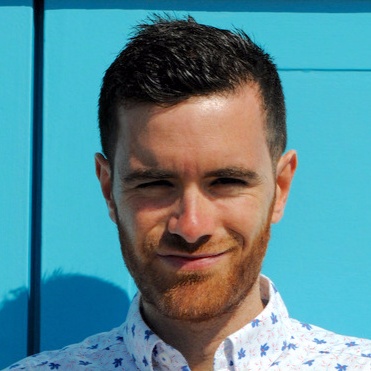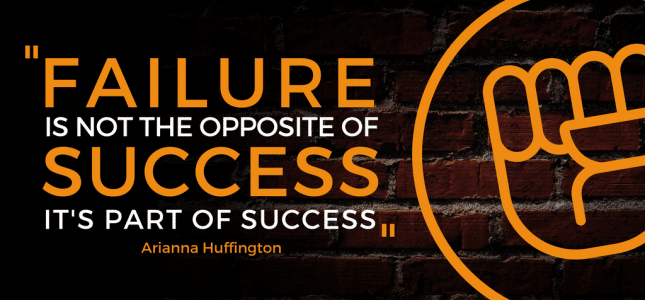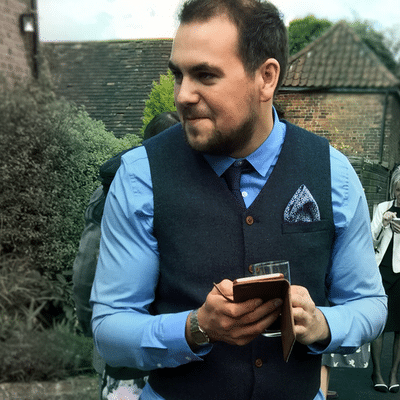FAILURE. It’s a big scary word for all of us and something we try to avoid throughout our lives. It is even scarier for those of us who are self-employed. We battle doubters, loneliness, imposter syndrome, financial risk, the tax man and a host of others, just to make something that is ours. The fear of FAILURE is something that keeps us up at night.
BUT it is also something that shapes who we are, how we doing things and how we learn. I wanted to get a range of freelancers together to share how they have learnt from failure. How it has led to something positive in their lives. And you, as a reader, to walk away with an understanding that failure is important and not always a disaster.
Whilst trying to pull this post together I was (respectfully) turned down by the majority of those asked. So let me outline my gratitude to those that were brave enough to contribute below. On with the show!
Chris Watterston – Designer Of App & Web Pixels in London
FAIL: I wanted to become my own boss for years, but never had the courage or felt it was the right time to do so. But for me, it happened like this — I meet my partner at around the age of 13 years old, we then became parents at 21 y/o, left my day job at 25 y/o and then had our second child 4 weeks after that. And right now, I am 28 years old, it’s 23:53PM on a very warm night and I’m sitting in the garden finishing off a report for a client and answering emails (here is proof), looks bliss doesn’t it – but let’s all be honest, things are VERY hard at times, I struggle for time, I stress out, I’m losing my hair (rapidly), I fail with time and keeping up with workloads, I have many potentially BIG personal projects that I want to work on but family and client work takes priority and all my time up, I question if I can continue to provide for my family with what I’m doing – yeh, I even sometimes ask myself why I don’t just pack it all in and go back to a “normal” job. In fact, I asked myself that exact question about 3 months ago.
LESSON: It blows my mind with how many people think that working for yourself is one massive doss (how little they know). It may feel like you’re a failure or failing, but you’re not. We’ve all been there. You’re building something amazing for the long run. We live and learn. We need to fail or feel like we’ve failed just so we can pick ourselves up and do it again – but this time, bigger and better. Never compare yourself to others (many do, I did but stopped), because others will only show you the highs and never the lows. Think of success as an iceberg – there’s a lot of failures and hard work that you never see because it’s hidden under the water, all you do see is the small part of high and dry success above the water.
 Katy Carlisle – Squarespace Web Designer in the Peak District
Katy Carlisle – Squarespace Web Designer in the Peak District
FAIL: I took on a client and it seemed to be a perfect match. She already had a Squarespace account but wanted some help setting up the website. We liaised by phone and email and there was nothing that made me feel that she was at all concerned about the direction of the work.
I didn’t hear from her for a week or so, and when I went onto the website, it looked totally different. I then received a brief email, stating that she’d not been happy with what I’d done, so she’d had to get another company to come and work on the site. She, therefore, didn’t think it was fair that she should have to pay me for all of my work. I’d never had that experience with a client up to that point, and I kept obsessively re-reading the emails, looking for signs of what had gone wrong. I tried to call, but she didn’t pick up the phone.
LESSON: Then I started to think about it from her perspective a bit more and emailed her back, explaining that I knew it must have been tricky to write that message and thanked her for being honest. She rang me pretty much immediately after I’d sent that message, and started the call by thanking me. She’d been so worried about saying anything negative that she’d bottled it all up and then panicked. We agreed to a compromise around the payment that seemed fair for both of us.
I was still disappointed that it didn’t work out, but what I really took from this was to put myself in my client’s shoes as much as possible. It also made me more aware of how much more effective face to face or phone conversations can be to avoid misunderstandings or resolve issues.
James Whitelock – Freelance Digital Marketing Consultant in Cambridge
– Freelance Digital Marketing Consultant in Cambridge
FAIL: I had a bad experience with a client recently that I could have, and should have avoided. The red flags started to appear early on in discussions, but despite my gut telling me to walk away I proceeded with them and caused myself a lot of unnecessary stress. From the off there was a clear distrust and lack of respect for my work. Every cost was haggled, every recommendation was challenged and scope slowly began to creep. They were paying me as little as they possibly could but expected the world. Their constant micro-management was also impacting the quality of my work and I was stuck in a vicious cycle. In the end, I cut ties with the company and learned a hard lesson.
LESSON: It’s okay to turn down work. Don’t take on every project that comes across your inbox. If it doesn’t feel right, trust your gut and say ‘no thanks’. Bad clients will eat up your time and suck the life out of you.

Sarah Bennett – Social Media Consultant and Trainer in Preston
FAIL: 2015 was a bad year for me. Initially, all was well. I was building-up a decent client base. I was working with some fantastic people and I was feeling confident. Fast-forward a few months and it had more or less all crashed down around my feet.
I’m not making excuses, but there are mitigating circumstances – becoming a single parent, moving home and battling anxiety. But, ultimately, I didn’t handle my business in the way I should have. What I should have done, is told my clients that I had issues and scaled back until I’d sorted my shit out. What I did instead was continue accepting work and for some reason, which I can only rationalise as ‘panic’ I took on even more work. Including projects that really weren’t right for me.
What followed was essentially a disastrous few months of missed deadlines, avoiding emails, phone calls and letting people down. It took the best part of a year to get my ‘mojo’ back and essentially recover my reputation. I still feel incredibly guilty now. One client even emailed my dad, to attempt to chase me. I’m still mortified by that.
LESSON: So, what did I learn? We’re all human and that includes your clients! I only wish I’d reached out when my problems began. I might have lost them as a client, but I wouldn’t have put them and me through the crap that I did. As a freelancer, the buck stops with you. Don’t take on anything that you realistically can’t deliver. It’s just not worth it.
 Simon Cox – Digital Consultant in Lingfield
Simon Cox – Digital Consultant in Lingfield
FAIL: Many years ago when I managed a global blue chip corporate website we were preparing for some regulatory changes coming into effect in Hong Kong. On the Friday I tried to restore some data and ended up following a process that actually erased the UAT version of the site. I raised the necessary emergency teams to get a back up restored which would mean redoing a days work. It turned out that although the IT team had a tape back up they did not have a server with enough space on to unpack it.
The next 24 hours were one long conference call with frantic IT teams shifting data around to make space. Saturday evening we had the UAT restored but the CMS kept failing. Turned out that the developer had not backed up the template files for the content. We found him visiting family in a remote village in rural India where he jumped on a borrowed moped to get to an office to be able to upload the files. We got the site live Monday morning having missed a deadline by 2 hours. A lot of good lessons were learnt that weekend by all. I then slept for 21 hours straight.
However, my greatest ever failure was at my primary school nativity in the role of 2nd Shepherd. I had one line to say but even the disappointed front row could not hear what I mumbled. That has scarred me mentally for life and is why I don’t do presentations.
LESSON: You can usually get over failure with a bit of sleep but sometimes you might need deep therapy.
Maija Ziga – Freelance Graphic Designer in Manchester
FAIL: From thinking back my biggest ‘failure’ / lesson was agreeing to help my mate’s boyfriend set up his new business in Sweden with a completely new brand identity and website. Since he lives and runs his businesses out in Sweden we had to work together via Skype calls twice+ a week just to catch up to where we’re at. Because I put the trust into my friend and the way the whole process was going, I didn’t bother with any contracts or any sort of agreement between us. So, we worked together for about 4 months at the time whilst I designed their new brand identity and website, to be launched at the end of this year.
I asked them to make a payment for the completed work and that’s when ‘shit hit the fan’ (so to speak). They disagreed with the time I’d put into the work and what I’d asked for. They valued my work based on a Latvian designer, who according to them would’ve spent a few hours on the job. So by the end of it, they had underpaid me by a few thousand pounds. Not great. So, I just sent off the stuff I had done and never went back to it.
LESSON: Being a freelance can be tough at times because no one tells you what is right and wrong, and what we should or shouldn’t do.
Every day is a new lesson if I’m honest. Failure could be a loss as well a lesson.
I think the main lesson here is to protect your arse first, even when working with family, friends or people you know. Make sure they understand what your work is worth and raise any red flags as soon as they appear. By red flags, I mean customers that at the first glance will be hard to work with. This could involve a high number of directors / people in charge of the project. Clients who want to control the whole project. Clients who’ll either not listen to the designer or just generally are very stubborn / rude. Remember it is ok to say ‘No’. Where possible, work with people who come to you because they trust you and believe your work is what they need, not the other way around.
I don’t think there are failures – just life lessons and experiences.

David Sayce – Digital Marketing Consultant in London
FAIL: Over promising and under delivering. Wanting to do good and help out others, one of my failures was to say yes to everything. All good intentions. Ultimately this ends up letting people down and has a detrimental impact on personal reputations. Failure all around.
The fact that I am writing this while running between meetings after promising Col I’d be happy to contribute, shows that while we can learn from failures it doesn’t alway prevent them happening again.
LESSON: As many others will no doubt note, failure is often not the big issue, the important part is understanding why it happened and learning from it.

Dawn Baird – Partner at Sensei in Northern Ireland
FAIL: Without any real strategy in mind, and having been a business owner for eight years already, I started a local business network in my very rural, small home town, together with a business friend – with the vague notion of raising our profiles and enabling professional networking for rural business owners. I called it Open Coffee, after an international, grassroots, informal networking format. Comically, I vastly underestimated the time it would take to establish, market and develop. While it was more successful in terms of numbers than any other local regional network of a similar format, my new business mentor at the time put his finger right on it and asked me how I planned to monetise it. I had no answer! He advised that my main business, Sensei – a communication consultancy – deserved all my attention. Ultimately, I made the painful decision to shut down the network. A paid network model simply didn’t suit the format and we had no-one keen enough to take it over.
LESSON: What I learned from this experience was to spend more time thinking and planning well in advance of actually implementing any future networks. I also realised that, ultimately, no-one will care as much as I do about my projects. On a positive note, it was heartening to know that while this business network ultimately failed, there are a huge number of people out there willing to form networks, partnerships and joint projects in order to achieve a common goal. The knowledge gained through this experience is something we have used to help develop other, similar, though more profitable networks and partnerships.

Fiona Scuiller – Translator & Interpreter in Hamburg
FAIL: “No, don’t worry about it, just translate the words!” This is the sentence that drove me to tears at the beginning of my translation career. I had agreed to translate a research paper on some obscure imagery topic that I knew absolutely nothing about, and I was tearing my hair out. I had only done it to help out a friend’s flatmate who was finishing his PhD, on the basis that he could “help with the terminology”. The problem is, when you don’t understand 60% of the words in a text, it becomes awfully difficult to form sentences and develop a mental picture of what the author is actually trying to say. Unfortunately, it turned out that the customer wasn’t that much of a help as he had no understanding of the translation process (the opening sentence is a direct quotation from him). But no: translation is not simply about translating words; it’s about translating ideas.
LESSON: I now only take on work in fields in which I have expertise (marketing, law, port logistics and human rights, mainly), whether I’m translating or interpreting. By doing so, I make sure I know what I’m doing and have an awareness of the broader context. It’s also nice to hear compliments like: “Oh, you’ve obviously worked in port logistics, haven’t you?” And I’m quite keen to save my hair, thank you very much.

Keir Gibson – Optimisation and Analytics Consultant in Manchester
FAIL: I work a lot in optimisation of Google Analytics accounts to increase the accuracy of data that flows through them. But my fail made that optimisation completely pointless… because I blocked all the data coming through! I was working with a profile/ view that had several hundred thousand sessions a month and applying filters to it to make reporting easier and more accurate. I added an IP filter that had a mistake in it and included traffic only from one IP address instead of excluding :(. The next day I saw no data for the previous day. An awkward call to the client and a slap on the wrist.
LESSONS: I learnt a few things from this;
1. I realised how important it was to have a process in mind to optimise/audit an analytics account and begin by planning out all the things you’ve found and seeing which order they go in.
2. The most important thing here was to either set up a test view/profile (if you don’t have one first), then run all the optimisation tasks like filters in this.
3. Test! Don’t just think a task is a one minute job in web analytics, test if the data is coming through. It’s especially true for anything done in Google Tag Manager. Real time is your friend.

Peru Buesa – Online Marketing Strategist in Brighton
FAIL: I had been working for digital marketing companies for 4 years, during which I witnessed with envy several friends leaving the rat-race to start their own ventures. I was very tempted all along, but I was terrified. I eventually resolved to getting out. It felt great, freedom at last! And there is still air to breath, food to eat and paths to walk (at any time!). But I had no plan…
I began to see people offering work to me. Some people wanted SEO, others wanted PPC, others wanted whole websites. I felt butterflies in my stomach…
I started saying ‘yes of course’ to all of them. Blinded by the prospect of keeping my savings, I started to accept anything on any terms. I didn’t want to deter clients by challenging them. Very soon I realised I couldn’t deliver the highest standards in all of those services, because I didn’t have a plan, and I didn’t have a system. Then I started working with a coach and I read the E-Myth.
LESSONS:
I realised that I needed a very easy-to-understand ‘product’ that worked. This way I could deliver more and sell more, as long I was able to challenge the client’s paradigm and guide him through the right path. In short:
1. Don’t focus on pleasing the client, challenge his assumptions and gain control as an expert.
2. Create a product that works and don’t do anything else until you can demonstrate it works first hand.
3. Optimise the product and start selling it.

Alex Hardy – Freelance Designer & Developer in Manchester
FAIL: This is actually my third stint at freelancing. So far so good and hoping it sticks. The second went fine (although it didn’t last long as I was offered a job which I took). My first attempt though was in my early twenties and definitely an expensive failure. At the time, I lacked the discipline needed to be my own boss. Being “your own boss” after all means exactly that. You have to be the one setting your “salary”, your leave allowance etc. I also didn’t have the network I do now to help find work.
LESSON: It can be a bitter pill for developers (who put a lot of stock in their technical skillset) to take, but strong relationships are what will keep you working. It’s simply not enough to have the “skills to pay the bills” as there are a lot of developers and somebody will be happy to undercut your quote. You need people to think of you as their go-to person.
Zack Neary-Hayes – Freelance SEO Consultant in Leeds
– Freelance SEO Consultant in Leeds
FAIL: I spent around 2 months trying to woo a potential client. I gave them free advice and spent hours on the phone to them. They were skittish, demanding, and worryingly, didn’t seem confident with their business offering. This should have set alarm bells ringing, but I was lured in by the fact that what they offered was pretty interesting and had massive potential for growth. I was already planning the work in my head. However, I failed to sign them up.
When we got down to nitty gritty of the services I could offer, they totally fell off the radar. I never heard from them again, despite my best efforts. I’m pretty sure they were just fishing for free advice.
LESSON: Take a brief and talk about budgets at the start of conversations. This will quickly weed out any time wasters or people who aren’t the right fit to work with. Also, don’t start trying to fix people’s problems before they’re a client, and even then, only fix problems and offer advice on the things you’re being paid for. Finally, trust your gut feeling about people. Whilst a business may seem cool, it’s the people within the business that you have to deal with on a day to day basis.

Col Skinner (aka Me) – Freelance Digital Consultant in Manchester
FAIL: In early 2017 I brought on a new client that I had worked very hard to acquire. I had a faint gut feeling from the start that things aren’t right but I ignored it in favour of all those shiny things that attract us to a new client. E.g. a rare or niche industry, big growth plans, a well known brand name, a big budget etc.
Anyway, things started to go awry with poor communication, a lack of direction on their part, a lack of understanding of their business and expectations that constantly needed to be managed (corrected). It got to the point where my heart sank each time an email popped up from them. I thought “here we go, what next”. During lunch with a friend, I found myself reeling off all the issues with this client and it hit me. “Why am I working with someone who brings me this much grief?”. I went back to the office and with a great sigh of relief, began the ball rolling for the departure of this client.
LESSONS: Trust my gut feeling and listen to my own concerns. After all, it is me who chooses to work with any client, as much as they choose to work with me. Also, dont settle for stress. Life is far too short to accept unnecessary or avoidable stress.
Thank you again to all those who contributed their thoughts. Do you have a failure and lesson you would like to share? Comment below:



